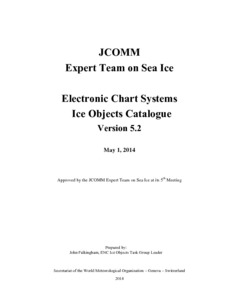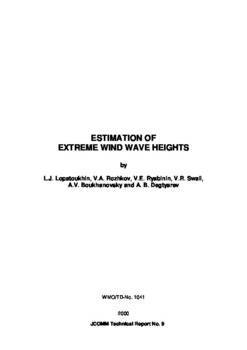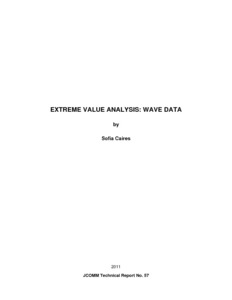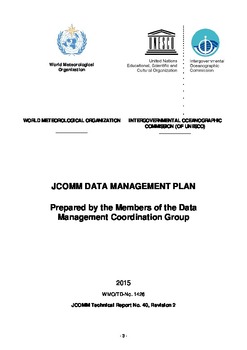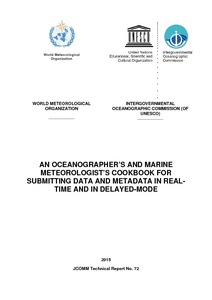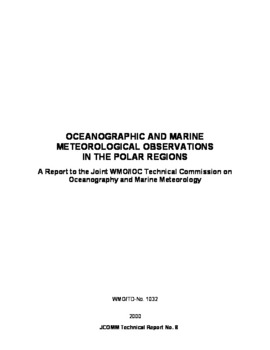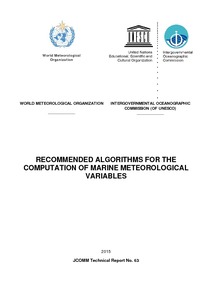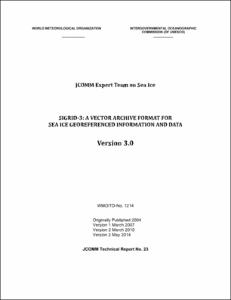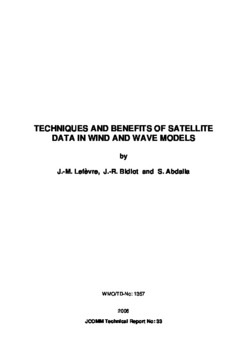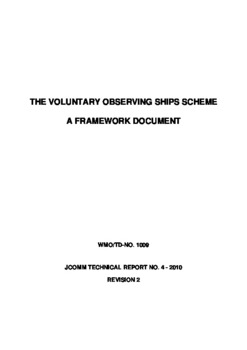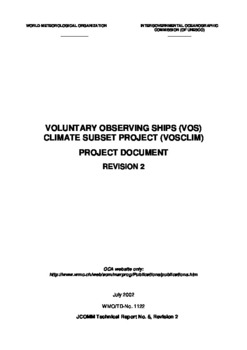Browsing JCOMM Technical Reports by Title
Now showing items 2-16 of 16
-
Electronic Chart Systems Ice Objects Catalogue Version 5.2, 2014 edition
(WMO/JCOMM Expert Team on Sea Ice, Geneva, Switzerland, 2014)Electronic Navigation Charts (ENC) and Electronic Chart Display and Information Systems (ECDIS) are becoming widely available on ships navigating in icy waters and it is necessary to provide ice data in a form that can be ... -
Estimation of extreme wind wave heights.
(WMO & IOC, Geneva, 2000)This publication provides not simple estimates of extreme wind wave heights, but informative and authoritative support in their decision-making. -
Extreme value analysis: wave data
(WMO-JCOMM, Geneva, Switzerland, 2011)Estimates of the m-year return value of significant wave height ─ the value which is exceeded on average once every m years ─ are needed for the safety control and design of ship, offshore, and coastal structures, ... -
Ice Chart Colour Code Standard, Version 1.0, 2014.
(World Meteorological Organization & Intergovernmental Oceanographic Commission, Geneva, Switzerland, 2014)This document describes two separate colour codes for use on ice charts: the first one based on total concentration (CT) intended for use when the stage of development is relatively uniform but concentration is highly ... -
JCOMM Data Management Plan.
(WMO & IOC, Geneva, 2015)JCOMM was established by the World Meteorological Organization (WMO) and UNESCO's Intergovernmental Oceanographic Commission (IOC) in 1999 to be their major advisory body on all technical aspects of operational marine ... -
Manual on Sea-level Measurements and Interpretation, Volume V: Radar Gauges. [includes Supplement Practical Experiences]
(Intergovernmental Oceanographic Comission of UNESCO, Paris, France, 2016)Volume 5 which is devoted specifically to ‘Radar Tide Gauges’. Radar range finders have been used in industry (where they measure the levels of liquids in tanks) and hydrology (for measuring river, lake and reservoir ... -
An Oceanographers’ and Marine Meteorologists’ Cookbook for Submitting Data and Metadata in Real-time and Delayed Mode.
(Joint Technical Commission for Oceanography and Marine Meteorology (JCOMM), Geneva, Switzerland, 2015)There are many marine meteorological and oceanographic (met-ocean) observations which are not currently contributing to WMO and IOC Applications. Several reasons may explain the situation, including for example reluctance ... -
Oceanographic and Marine Meteorological Observations in the Polar Regions - A report to the Joint WMO-IOC Technical Commission for Oceanography and Marine Meteorology.
(WMO & IOC, Observations Coordination Group (OCG), 2000)In Geneva, December 6-8, 1999, a meeting of experts was held to discuss a JCOMM/GOOS Polar Region Strategy. It was agreed on the importance of developing an integrated Polar Region Strategy Document for JCOMM. This document ... -
Proceedings of the Ice Analysts Workshop, Rostock, Germany, 12-17 June 2008.
(WMO & IOC, Geneva, 2008)These are the Proceedings of the Ice Analysts Workshop, Rostock, Germany, 12-17 June 2008. CD ROM and available ftp://ftp.wmo.int/Documents/PublicWeb/amp/mmop/documents/JCOMM-TR/J-TR-43-IAW-2008/. -
Recommended algorithms for the computation of marine meteorological variables
(Joint Technical Commission for Oceanography and Marine Meteorology (JCOMM), Geneva, Switzerland, 2015)A range of variables observed under the Voluntary Observing Ship (VOS) scheme, and circulated over the Global Telecommunication System (GTS) in real-time (RT), or exchanged internationally in delayed mode (DM), may be ... -
SIGRID-3 : a vector archive format for sea ice georeferenced information and data. Version 3.0.
(WMO & IOC, Geneva, Switzerland, 2014)This document describes Version 3.0 of SIGRID-3 (Sea Ice GeoReferenced Information and Data), an evolution of the SIGRID series of standards for coding, exchange and archiving of digital ice charts. Version 3.0 retains ... -
Techniques and Benefits of Satellite Data and Wave Models.
(WMO & IOC, Geneva, Switzerland, 2006)This report documents techniques and benefits of satellite data in wind and wave models. It provides an overview of available satellite wind and wave data and their possible usage based on the questionnaire prepared by the ... -
The Voluntary Observing Ships Scheme: a framework document. Revision 2.
(Ship Observations Team, WMO & IOC, Geneva, Switzerland, 2010)Ships of the World Meteorological Organization (WMO) Voluntary Observing Ship (VOS) scheme have always been an important component of the global observing system of the WMO, providing meteorological ... -
Verification of operational global and regional wave forecasting systems against measurements from moored buoys.
(WMO & IOC, Geneva, 2006)The purpose of this JCOMM Technical Report is to document the global wave model verification activity, giving details of the working mechanism and file formats so that modeling centres not yet engaged may judge whether or ... -
Voluntary Observing Ships (VOS) Climate Subset Project (VOSCLIM) - Project Document, Revision 2.
(WMO & IOC, Ship Observations Team, Voluntary Observing Ship (VOS) Climate Project, 2002)This project document lists the primary objective is to provide a high-quality subset of marine meteorological data, with extensive associated metadata, to be available in both real time and delayed mode. Eventually, it ...
 Repository of community practices in Ocean Research, Applications and Data/Information Management
Repository of community practices in Ocean Research, Applications and Data/Information Management
